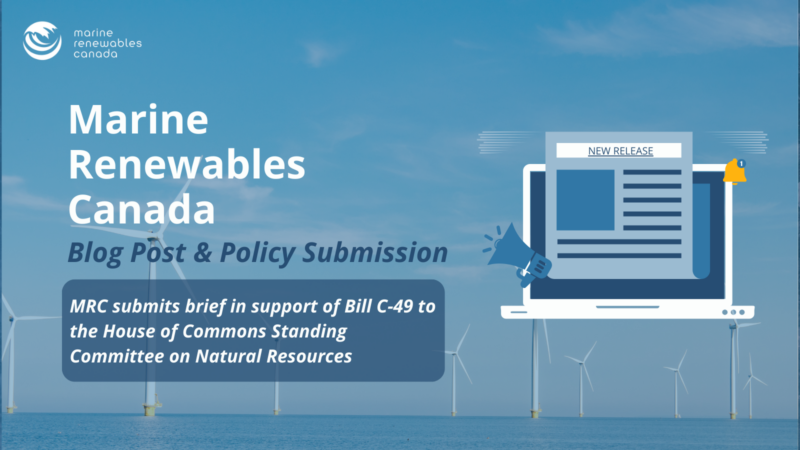Harnessing Canada’s Offshore Winds: The Promise and Progress of Bill C-49

(February 16, 2024) As the world intensifies its commitment to renewable energy, Canada stands at a pivotal crossroads, with the potential to become a global leader in a sector that remains untapped nationally: offshore wind. Bill C-49, Canada’s proposed legislation to govern offshore renewable energy, is at the core of this effort. It puts forward a promising regulatory framework that builds upon the important offshore oil and gas experience in the provinces of Nova Scotia and Newfoundland and Labrador .
Yesterday, Marine Renewables Canada’s (MRC) Executive Director, Elisa Obermann, appeared before the Standing Committee on Natural Resources to provide testimony on the importance of Bill C-49 for Canada’s offshore wind industry. MRC has also submitted a more detailed brief to the Committee, which explains the potential of this renewable energy resource to bring economic growth, local jobs, and renewable energy to Canada’s grid and international markets.
Some highlights 👇
Canada’s Abundant Resource. Nova Scotia’s offshore alone boasts a technical potential of 938 GW. Leveraging even a fraction of this potential is sufficient to propel Canada towards its net-zero goals and kickstart a truly home-grown green hydrogen industry.
Promising Global Market Trends. Currently with over 64 GW of installed capacity, offshore wind is rapidly growing internationally and is slated to have a market value of $1 trillion by 2040. Moreover, with increased deployment over the last 10 years, the costs of offshore wind have dramatically reduced. The global weighted average levelized cost of energy (LCOE) for offshore wind now sits at 8.1¢/kWh.
Critical Need for Regulation. The stage is set – Canada’s first offshore wind lease auction is slated for 2025 in Nova Scotia, local and international companies are actively looking to invest and develop offshore wind in Atlantic Canada, stakeholder engagement at the provincial and federal levels is underway, and we have experienced regulators ready to accept their expanded offshore renewable energy mandate. The crucial missing piece at this point is the lack of a regulatory framework to allow any of this to move forward. Bill C-49, alongside other parallel regulatory and policy initiatives underway, is that framework.
More on this from MRC’s Executive Director, Elisa Obermann 👇
Read MRC’s Brief Here👇
